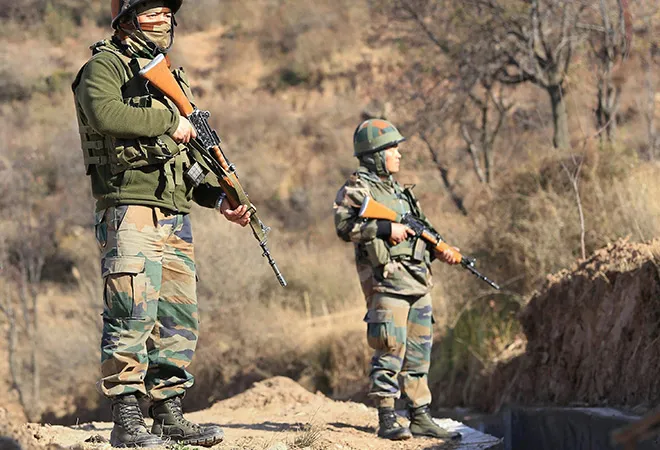After the Pulwama attack, Sino-Indian relations once again have come under a scanner. In its initial reaction to the attack which killed 44 CRPF personnel last week, Chinese foreign ministry spokesperson said: “China has noted the reports of suicide terrorist attack. We are deeply shocked by this attack. We express deep condolences and sympathy to the injured and bereaved families.”
JeM jamboree
But when asked about China’s stand on the listing of Masood Azhar as a global terrorist by the United Nations Security Council, the refrain was familiar: “As for the issue of listing, I could tell you that the 1267 Committee of Security Council has a clear stipulation on the listing and procedure of the terrorist organisations.”
Chinese position underwent a subtle shift against the backdrop of global outrage after the Pulwama attack when it suggested that China will participate in the UN Security Council discussion for listing Azhar as a global terrorist in “an objective, unbiased and professional manner,” and that Beijing “will continue to do so and remain in communication with all parties including India on this issue.”
Referring to New Delhi’s outreach to members of the Security Council to list Azhar as a global terrorist, Beijing argued that “JeM has been included in the Security Council terrorism sanctions list. China will continue to handle the relevant sanctions issue in a constructive and responsible manner.”
Chinese position underwent a subtle shift against the backdrop of global outrage after the Pulwama attack when it suggested that China will participate in the UN Security Council discussion for listing Azhar as a global terrorist in “an objective, unbiased and professional manner,” and that Beijing “will continue to do so and remain in communication with all parties including India on this issue.”
Though India continues to hope for a change in Chinese attitude, Pulwama attack notwithstanding, is likely to remain what it has been for the past few years: that of shielding Pakistan and Azhar. Despite India’s diplomatic outreach, China has managed to consistently block India’s bid to get JeM chief Azhar declared as a designated ‘global terrorist’ at the UN by refusing to end its "technical hold" on the ban on Azhar.
This has happened twice this year and Beijing’s justifications are getting curiouser and curiouser. Recently, China’s vice foreign minister Li Baodong justified his nation’s stance by arguing that “China is opposed to all forms of terrorism. There should be no double standards on counterterrorism, nor should one pursue own political gains in the name of counter-terrorism.” So, while many in India continue to harbour hopes of China becoming our partner in counter-terrorism efforts, Chinese policy makers are under no such delusions. After all, if Azhar is a problem today, it is India’s own doing: He was released by the Vajpayee government in December 1999 in exchange for the release of the passengers of the hijacked Indian Airlines flight IC-814. Ever since, he has been the bane of India’s security establishment.
Despite India’s diplomatic outreach, China has managed to consistently block India’s bid to get JeM chief Masood Azhar declared as a designated ‘global terrorist’ at the UN by refusing to end its “technical hold” on the ban on Azhar.
Similar trajectories
After JeM claimed responsibility for the attack on the Air Force Base in Pathankot in 2016, India has focused its efforts in getting Azhar declared a global terrorist under the aegis of the UNSC 1267 committee. China used its veto power to block the proposal banning Azhar in December 2016. After the Doklam crisis, there has been a reset in Sino-Indian relations with Prime Minister Narendra Modi’s trip to to China for the Wuhan summit last year. But even the spirit of Wuhan has failed to impact the Chinese position on the issue of Masood Azhar. For India, Wuhan summit was a way to manage the negative externalities emanating out of Trump’s erratic economic policies. For Xi Jinping, it was an opportunity to rebuild fraying ties with India at a time when Washington was targeting Beijing with a single minded focus. But it in no way meant that China would give up building its military along the border with India or cease challenging India in South Asia and the Indian Ocean region. China’s support for non-state actors against India is in any case longstanding. Its role in encouraging and supporting insurgents in India’s Northeast is well documented. After the Pulwama attack, even as India has launched a diplomatic offensive to isolate Pakistan, it is not readily evident if it would have much of a success with key partners of Pakistan, China and Saudi Arabia.
Wuhan in tatters
Saudi crown prince Mohammed bin Salman has already signed a declaration with Pakistan about avoiding “politicisation of the UN listing regime.” This is of course aimed at India’s efforts to secure a UN ban against Masood Azhar, even after Prime Minister Narendra Modi signed an MoU with Saudi Arabia during his 2016, on cooperation in exchange for intelligence related to money laundering and terrorism financing.
China will continue to shield Pakistan. The Wuhan spirit, if it ever existed, is gasping for breath. And New Delhi will have to firm up its response to China. India should signal its resolve of looking at its China policy through the Pakistani prism, if China wants to continue with its Pakistan policy. While the two Asian giants share global interests, their bilateral issues cannot be brushed under the carpet in favour of a mythical Asian century. China should get this message now.
This commentary originally appeared in Mail Today.
The views expressed above belong to the author(s). ORF research and analyses now available on Telegram! Click here to access our curated content — blogs, longforms and interviews.




 PREV
PREV


